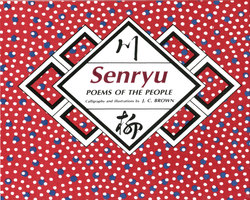Читать книгу Senryu Poems of People - J. C. Brown - Страница 5
Оглавление| A Note on Senryu |
Senryu is a form of Japanese poetry named after a man who wrote no senryu. Karai Hachiemon (1718-1790) was a government official in the Asakusa district of Edo (now Tokyo), a post he inherited from his father. Under the pen name Senryu, meaning River Willow, he was also a noted poet, and acted as judge at contests of maekuzuke, or "verse capping." In this traditional form of literary amusement, a given short verse of fourteen syllables was capped by a longer verse of seventeen syllables to produce a thirty-one-syllable poem in the traditional tanka form (the longer verse could also be capped by the shorter). The capping portions, known as tsukeku, eventually came to be read and appreciated by themselves. In 1765 Karai Senryu published a selection of tsukeku that reflected his personal taste and humor. This anthology, Yanagidaru, became widely popular and was followed by 22 more of the same title, also compiled by Senryu, and a further 144 volumes compiled by his successors to the tradition.
